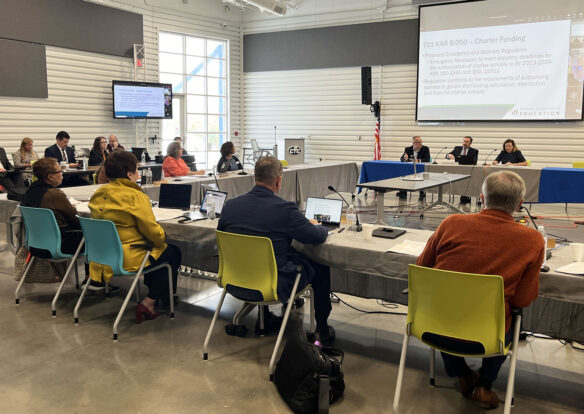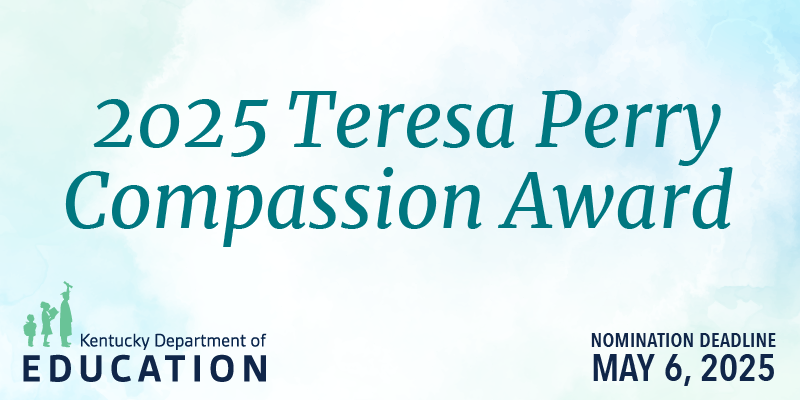
The Kentucky Board of Education held its two-day meeting on Oct. 11-12 at the Logan County Career and Technical Center. The board approved charter school regulations required by state statute.
Photo by Toni Konz Tatman, Oct. 12, 2022.
The Kentucky Board of Education (KBE) approved 10 regulations relating to public charter schools in Kentucky during its two-day meeting on Oct. 11-12 at the Logan County Career and Technical Center (CTC). The regulations were previously approved by the Local Superintendents Advisory Council.
Updates to the regulations are necessary to conform to the requirements set by House Bill (HB) 9, a bill that modified Kentucky’s charter school law and set up a funding mechanism for charter schools.
KBE Chair Lu S. Young opened the discussion by addressing the controversial nature of the regulations that were recommended to the board.
“As a board, we are constantly engaged in policy discussions on how we improve both opportunities and outcomes for all kids in Kentucky,” she said. “With that rich conversation comes excitement to act in ways that we believe are in the best interest of kids.
“Unfortunately, HB 9 was very prescriptive and leaves little to be decided by the education policy experts on this board, at KDE and throughout the state. While I believe there are constitutional uncertainties with HB 9, … it will be up to the judicial branch to determine whether HB 9 is constitutional, not this board.”
Education Commissioner Jason E. Glass acknowledged that there are several constitutional issues with the statute that have carried over into the regulations. Glass said he would likely not expend KDE resources defending HB 9 if such a legal challenge were brought.
The regulations included four amended regulations and one new ordinary regulation. There are also five identical emergency regulations that become effective upon approval by the KBE and official filing. The purpose of the emergency regulations is to meet the statutory deadlines required by HB 9 that would allow, and in some cases mandate, a charter school to open next school year.
Kentucky Department of Education (KDE) Associate Commissioner Kelly Foster and Matthew Courtney, policy advisor in KDE’s Office of Continuous Improvement and Support, presented the first eight regulations to the board.
Courtney said all amendments to the regulations were made in order to align with the language in HB 9 and the changes do not exceed the requirements of the statute.
Regulation 701 KAR 8:010 and its companion emergency regulation lay out the process of how a student would apply to attend a charter school. The regulation was amended to add language to clarify “enrollment preference,” and resident and non-resident enrollment policies.
Regulation 701 KAR 8:020 and its companion emergency regulation lay out how a charter school would apply to an authorizer and other requirements of the authorizer after application. An authorizer is the public entity responsible for oversight of the charter school. Amendments to the regulation included clarifying language to better align the regulation with the current statute. This includes removing language that allows the education commissioner to review and approve charter applications, since the commissioner no longer has that authority under HB 9.
KBE member Randy Poe said he’s heard confusion from some potential authorizers about their role as it relates to the charter school.
“If the authorizer enters into that contract, then they have a legal obligation to make sure that school works and they could potentially be held accountable if that school goes under,” said Poe.
Amendments to regulation 701 KAR 8:030 and its similar emergency regulation include procedures for a charter school to appeal a decision made by an authorizer. Regulation 701 KAR 8:040 and its similar emergency regulation only included technical changes to align with HB 9 and did not include any changes to content.
While the board approved these eight regulations, many members made it clear that they were only voting yes to meet the requirements of the statute. Many members said they do not support the creation of charter schools in Kentucky.
“I think that these regulations unfortunately take local control out of the picture, and we have locally elected board members to make these decisions and they should be the ones making those decisions,” said Poe. “But as you stated earlier, we have a responsibility to do our part and then ultimately the courts will decide (the constitutionality).”
“I am voting yes because of my responsibility to carry out these regulations,” said KBE member JoAnn Adams, “not because I believe these are the best regulations for our schools.”
Proposed Regulations for Charter School Funding
KDE Associate Commissioner Robin Kinney, KDE Office of Finance and Operations (OFO) Policy Advisor Matt Ross and OFO Director Chay Ritter also presented the board with a regulation and its accompanying emergency regulation regarding the funding of charter schools in Kentucky.
Regulation 701 KAR 8:050 and its companion emergency regulation are being brought forward to conform to the requirements of HB 9. Kinney said most of the regulations refer back to the statute’s language.
HB 9 requires that the state board promulgate administrative regulations to govern: the calculation and distribution of funds that are due to public charter schools from school districts; the schedule of the distribution of those funds; and the imposition of fines for the late distribution of funds.
The statute requires that for the purposes of local and state funding, a public charter school will serve as a school of the district of location (DOL), or the district where the charter school is located. For federal funding, a charter school will serve as its own local education agency, which is a term primarily used by federal agencies to refer to local school districts.
Charter school students will be included in the average daily attendance (ADA) count for the district of location and also in the aggregate and ADA for transported students.
Typically, when KDE calculates state funding, it refers to the school’s data from the previous school year. However, from the beginning of instruction through December of the first year of operation for a charter school, DOLs will calculate funding based on a projection of the charter school’s enrollment and demographics and the DOL’s overall enrollment and demographics. Calculations will be adjusted in January of the first school year of operation to reflect the first semester’s actual data. The following years of operation will be calculated using actual data from the prior school year.
HB 9 also says the district of location is responsible for providing the charter school with its allotted Support Education Excellence in Kentucky (SEEK) funding, any additional funding provided for in the state budget, any additional funding provided for by KDE, and funding for at-risk students, exceptional child students and home-hospital students.
If a district provides transportation to charter students, then it will receive SEEK transportation funding just as it would for any other district-transported students. Districts and charters also could agree on transportation funding per the charter contract or a separate agreement. If a charter provides transportation, then the DOL would transfer transportation funding to the charter. If it is not provided, then no transportation funding is transferred and transportation is not provided to charter students.
HB 9 says funds should be transferred by the DOL throughout the school year according to a schedule determined by the KBE and the scheduled dates must be within 30 days of when the funds are transferred to the DOL. If a district fails to transfer required funds to the charter school, the district will be fined 5% of the amount of the funds that are to be transferred.
The regulation also requires that with the assistance of KDE, the DOL must provide the charter school with a written estimate of the projected funding that will be due to the charter school through December of the first instructional year, on or before Feb. 1 preceding the charter’s first instructional year.
While the board approved the regulations, they again raised concerns about the constitutionality of the regulations and statute.
“I voted to approve these funding regulations because I believe it is my duty to do so. At the same time, I have grave concerns about the constitutionality, as well as the feasibility of these regulations as a matter of practical implementation, especially as they relate to funding,” said Young.
“I am also concerned about opening up this board, our commissioner and the department to potential litigation upon approval of these regulations because of the weaknesses we have wrestled with today. But as we have discussed, I believe any such litigation would be a challenge to HB 9, not the actions of this board.”
In other business, the board:
- Was welcomed to Logan County CTC by Principal Beth Frogue and Superintendent Paul Mullins;
- Presented the 2022 Kelly Award for Business and Education Partnerships to Mike Heskith, president and owner of Superb IPC;
- Approved the KBE’s 2022-2023 legislative goals and priorities;
- Approved the commissioner’s 2021-2022 evaluation and 2022-2023 goals;
- Approved the 2022-2023 evaluation procedures and communication procedures;
- Approved the strategic priority and criteria for the 2022 Kevin C. Brown Strategic Priority Award;
- Approved consent agenda items:
- Appointments to the Kentucky School for the Blind Advisory Board;
- 2022-2023 tax rates levied;
- Committee assignments for KBE members Joud Dahleh and Joanna Stevens; and
- Litigation report;
- Met in their assigned committees. The Curriculum, Instruction and Assessment Committee discussed and approved the implementation of a statewide Portrait of a Learner. The Operations Committee approved the correction of the 2021-2022 local district tax rates levied for Anchorage Independent School District;
- Heard an update from KDE Chief Performance Officer Karen Dodd on the Kentucky United We Learn Council;
- Approved a state of consideration for 704 KAR 3:305, minimum requirements for high school graduation;
- Heard reports from Glass about ongoing work at KDE and the Council on Postsecondary Education President Aaron Thompson; and
- Approved the Comprehensive Support and Improvement Turnaround Vendor List.




Leave A Comment